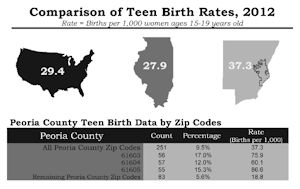Contraceptives are accessible to some Peoria women, not all

Photo by Clare Howard Dr. Sarah Ramirez, women’s health fellow with UnityPoint Clinic Family Medical Center on Main Street, reviews documentation with medical student Seth Van Heukelom. Ramirez said family practitioners are in an ideal position for initiating discussions about long-term contraceptives.
Teen-aged girls in some areas of Peoria have more than twice the pregnancy rate as their counterparts nationwide but limited access to long-term contraceptives.
Overall, the teen pregnancy rate in the United States is comparable to Third World Countries, and Peoria has one of the highest rates in the nation.
“Part of the problem is it’s difficult to obtain contraceptive counseling in Peoria . . . access to care,” said Randy McClallen, Peoria City/County Health Department. “This is really a health issue that affects everyone in the community.”
The American Society of Pediatricians issued recommendations three months ago calling for all pediatricians to provide teens with counseling on long-term reversible contraception. That includes I.U.D.s and implants. The society said these methods are best for teens who may have difficulty adhering to a routine such as never missing a birth control pill or always using condoms. (Failure rates for I.U.D.s are 0.8 percent; implants, 0.05 percent; birth control pills, 9 percent; condoms, 18 percent.)
The Illinois Department of Healthcare and Family Services issued a directive in August calling for all clinics that accept Medicaid to offer counseling on a complete range of FDA-approved contraception.
But despite these recommendations and regulations, access for Peoria females can be limited.
Two clinics operated by Heartland Community Health Clinic on Armstrong and Garden do not offer contraceptive counseling and refer patients to their other clinics, some of which have restricted hours for these services, said Mary Auer, clinical director at Heartland.
However, Auer said this is not a barrier to women.
“We rent from OSF and we go by their rules. This is not a (limiting) factor at all that we can’t do this at all locations,” she said.
Heartland employees do not insert I.U.D.s or implants. Auer said some of the organization’s primary care physicians choose not to receive training in these procedures, but OSF residents in obstetrics and gynecology have received training and work a half day a week at the Heartland clinic on Wisconsin, Auer said. Other Heartland clinics have health care professionals providing these family planning services.
A full-range of FDA-approved contraception for patients on Medicaid is available at UnityPoint Health-Methodist Family Clinic on Main Street and UnityPoint-Health Clinic on Allen Road.
Although the Affordable Care Act covers contraception without cost to patients, it is often difficult for patients to find a provider.
Dr. Amanda Wright, practicing at the UnityPoint clinic on Allen Road, said the best way to help girls avoid unwanted pregnancy is to start talking with patients early as part of regular primary care.
“This discussion is natural with a family physician. It’s another part of keeping yourself safe,” she said. “This discussion is part of health care. It’s not morality.”
Wright puts in I.U.D.s and said residents at UnityPoint Health-Methodist are trained in this procedure.
Dr. Sarah Ramirez, women’s health fellow, UnityPoint Health-Methodist Family Clinic on Main Street, said, “The beauty of seeing a family doctor is we see the whole family. We have a relationship with the family, and we can help the family navigate these conversations. We routinely start these conversations.
“When our patients hear or read something, it’s nice when they come to us with questions. That’s part of comprehensive family care.”
Ramirez said adolescents are one of the hardest groups to talk with and no topic should be out of bounds.
“If it’s not an honest conversation, it will push them away,” she said.
Both Wright and Ramirez expressed hope Peoria School District 150 will begin teaching comprehensive sex education including evidence-based information on contraception.
Legislation passed by both houses of the state Legislature and signed into law in 2013 by Gov. Pat Quinn mandates that school districts teaching sex education must include evidence-based instruction in contraception in addition to abstinence. Peoria District 150 has historically taught an abstinence-based curriculum that has been documented to be ineffective. Some comprehensive instruction has been available in the schools by personnel provided by outside agencies.
The new law went into effect January 2014. District 150 expects to have a curriculum in place by September 2015 starting with sixth grade, said Maureen Langholf, director of special education who oversees health services.
The school district is partnering with the Peoria City/County Health Department, Hult Health Center and other social service agencies in Peoria to develop the curriculum.
According to Langholf, the new curriculum will cover decision-making, access to health resources, discussion of safe touching, HIV, reproduction, pregnancy and birth.
“We do have to teach abstinence . . . the importance of abstinence and the risks of contraception,” Langholf said.
Asked about missing the Janaury 2014 deadline, she said, “We can’t just throw this together” and partnering with other agencies in the community requires time, as does obtaining School Board approval for the curriculum.
Monica Hendrickson, epidemiologist at Peoria City/County Health Department, said teen pregnancy and sexually transmitted infection rates are not “outbreaks” but are “endemic in our community” due in part to separating these issues from health care and making them moral issues.
“Teen births in the United States are comparable to Third World countries . . . countries without public education systems,” Hendrickson said. “To see change, the community as a whole needs to talk about these rates as health issues.”
She said school children study religions of the world, and parents don’t have the right to opt out of these classes for fear their children will be converted. She views comprehensive sex education similarly and said if sex ed is viewed as health wellness, there is no need for parents to opt out for their children.
“As a community, we cannot allow information not to be available,” she said.
Although Heartland does not provide a full range of contraceptive services at all clinics during all hours, Auer said Heartland does not refer patients to Planned Parenthood.
Planned Parenthood Illinois president Carole Brite said her organization is aware of the situation in Peoria and operates extended hours at its clinic at 705 NE Jefferson St.
“We want to make sure we provide the most access we can,” she said, noting that the Peoria clinic provides contraceptive counseling to about 4,000 women a year and the numbers are increasing.
“The Illinois Department of Healthcare and Family Services requires every clinic that accepts Medicaid to provide patients with every FDA- approved form of contraception. This is a directive,” Brite said, confirming that Planned Parenthood clinics comply with this regulation.
Dr. John Carroll, a Peoria physician who founded the charity Haitian Hearts, has labeled the issue concerning Heartland contraception “dishonest and disingenuous.”
Carroll said as a Catholic he is personally opposed to contraception but was disappointed when the Peoria bishop railed against President Barack Obama and the Affordable Care Act concerning the contraception mandate after OSF has followed a practice for over 20 years allowing its doctors to write prescriptions for contraceptives by temporarily waiving their status as OSF employees during the moments they write on their private prescription pads.
Carroll sees this as a market-driven exception to Catholic dogma.
Joseph Piccione, the hospital ethicist attributed with devising the plan, did not respond to a request for an interview.
Carroll, who advocates for health care for poor Haitians, called it “ironic” that at locations owned by OSF, Heartland is restricted from dispensing contraceptives to poor women but physicians at the hospital can provide contraceptives to women covered by insurance.

